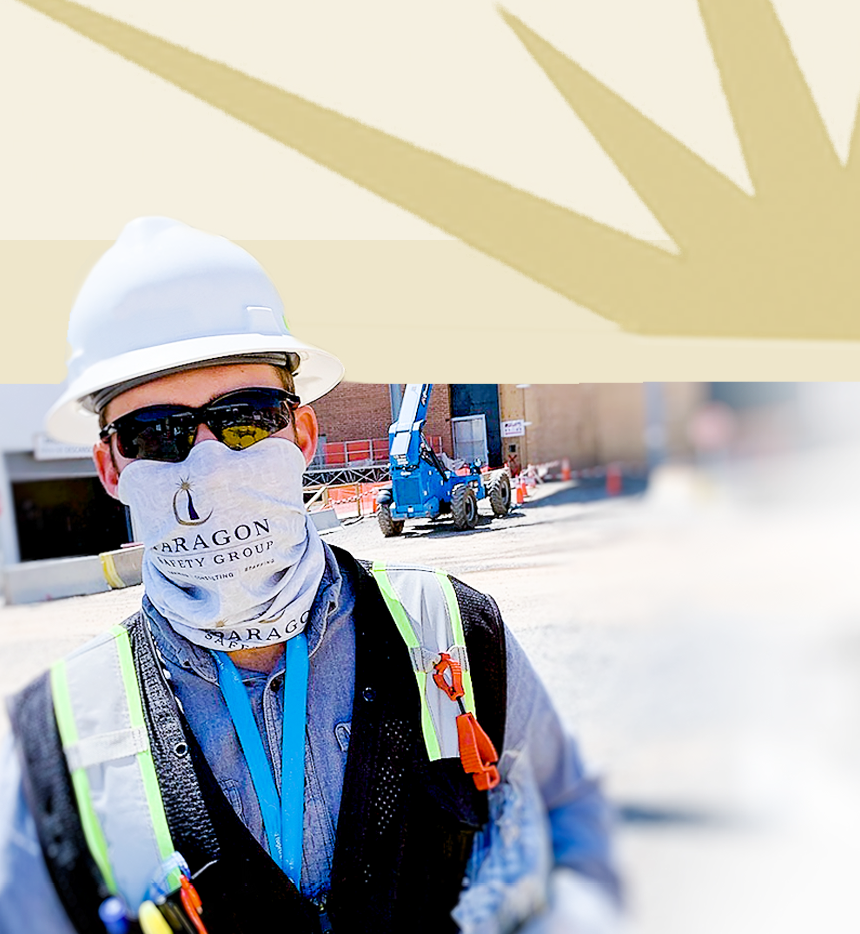Wearing Facemasks for COVID-19
A Complex Problem for Employers
One reason why COVID-19 has spread so quickly across the world is that many people who have the virus have no symptoms, and don’t feel sick.
That’s why the CDC recommends that we wear simple cloth face coverings when we’re out in public: not because it will keep the person wearing it from getting sick (it won’t, unless it’s an N95-rated respirator), but because it can prevent others from catching the virus.
Wearing a facemask is for the protection of other people, not yourself.
And if you have employees on a construction site or in a factory, requiring them to wear a face covering can be an effective way to prevent the spread of the virus.
The question is – does your company accept any risk or liability by choosing to require facemasks be worn on the job?

Companies have to provide PPE to protect against work hazards that can’t be removed through any other means. Is COVID-19 a work hazard? Absolutely. Do face coverings help prevent that hazard? The CDC says “yes.” Logic would then follow that if facemasks are a vital tool to prevent the virus spread, that they should be required and provided, so the company knows for sure that all employees are protected. We believe that liability comes not from providing the facemask, but from NOT requiring/providing them at all.
Imagine if you ran a machine shop and made safety gloves ‘optional’ because you were worried someone would get injured wearing gloves you provided – the first person to get a cut will march straight to their lawyer, who will ask “why didn’t you make protective equipment mandatory and provide it for all employees?” With a case of COVID-19 caught on the jobsite, the question would be the same – “why didn’t you make employees wear facemasks to make a safer workplace?”
So, are cloth face coverings considered PPE, and subject to OSHA’s PPE requirements?
Unfortunately, the answer to this question is not straight-forward.
Reasons why face coverings might NOT be considered PPE:
- Normally when we think of PPE, we think of equipment worn by employees that protect them from hazards. When you wear safety glasses, you are doing so to protect your own eyes, not anyone else’s. But wearing a face covering is to protect other people from catching your viruses. Can face masks be considered PPE if they aren’t designed to protect the person wearing them?
- A simple face covering is NOT the same as a respirator and does NOT require a full respirator program, medical evaluation, or a fit test like true respirators do. In the past, if an employer has determined (by doing a thorough hazard analysis) that an actual NIOSH-approved respirator is not required to keep someone safe doing a particular work task, employees can choose to use a surgical mask if it makes them feel more comfortable and the employer is not required by OSHA standard to do anything special – no respirator training or fit test, for instance.
Reasons why face coverings might be considered PPE:
- Regular clothing can keep you from some basic workplace
injuries, but aren’t considered PPE because they are a normal, regular thing
for people to wear. You probably wouldn’t want to use a circular saw without
any pants on, but that doesn’t mean pants are PPE.
However, a facemask is not a normal piece of apparel worn in typical situations, and because of that, may be considered PPE. - If you choose to make the use of facemasks mandatory for your employees, because that’s what is required to keep the workplace safe, that is the very definition of PPE.
Long story short: This is a gray area, and OSHA has not weighed in. For the time being, we have to use common sense and our best judgment to make sure we are providing workplaces that are safe for our employees.

At Paragon, we recommend that:
- You DO require a simple face covering to be worn at all times by your employees
- You SHOULD provide the face covering – be it a simple bandana, elastic scarf (like a Hoo Rag – ask us if you need some), surgical mask, or a non-N95 filtering facepiece. Ensure that your employees are wearing the face covering YOU provided – and not their own (just like you wouldn’t let them wear their own hard hat or safety gloves).
- You SHOULD provide basic training on how to wear them correctly, how to wash them, and when they need to be replaced.
And make sure you do this in conjunction with a broader plan to make a more COVID-resistant jobsite – facemasks are not enough! Promote social distancing, handwashing, and other measures that make it hard for the virus to spread.
By requiring face coverings and providing them to employees with appropriate training (along with other steps – providing hand wash facilities, for instance), you are taking control of your destiny, making sure that you’re taking every precaution you can, with the goal of keeping the safest work environment possible for your employees (short of stopping production completely). It’s the easiest and best way to cover all of your bases.
Have any other questions about face coverings, PPE use, and keeping your workplace free from the COVID-19 virus? Let us know via email, or call us at (919) 329-0006.
